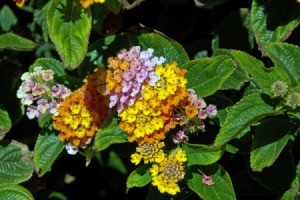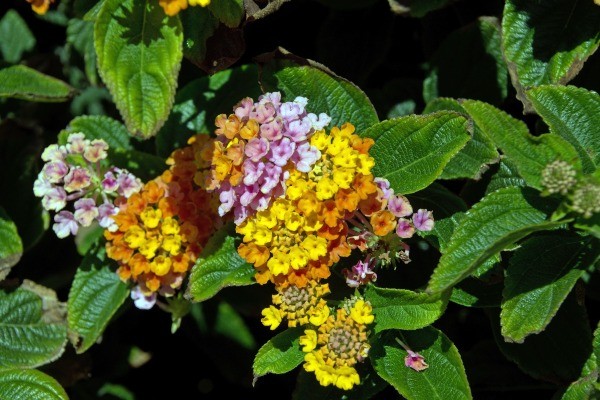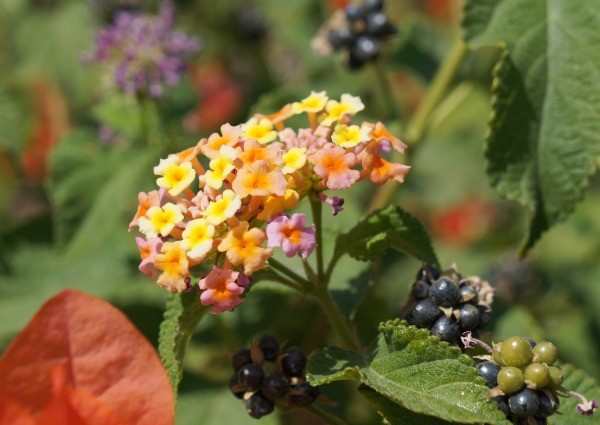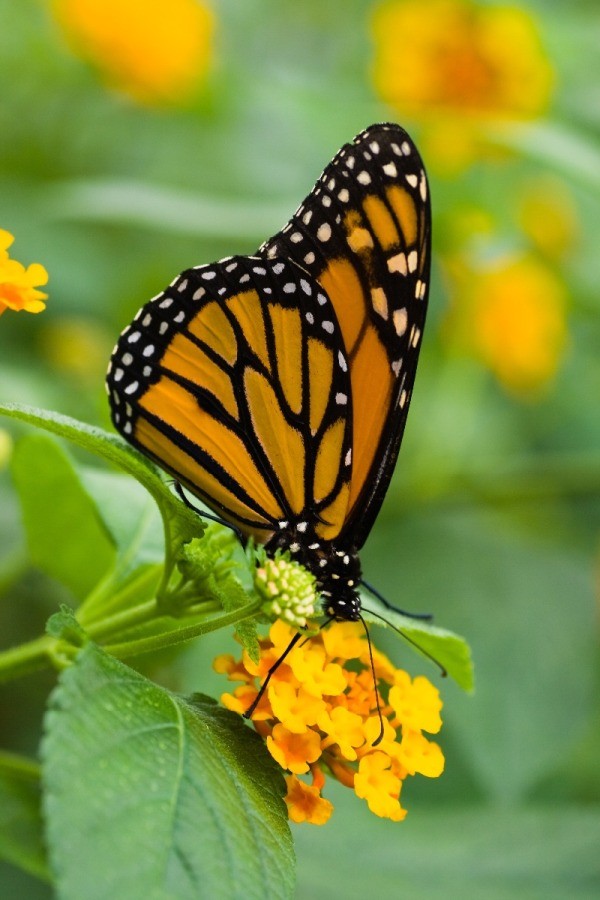
 Verbenaceae, commonly known as lantana is a fast growing tropical American native. It is grown as an annual in all zones below 8, and may even freeze in zones 8 - 10. It is typically grown as a ground cover, shrub, or in containers, including hanging baskets, depending on the type you select. The two types typically grown in gardens are Lantana montevidensis, the trailing variety and Lantana camera, a woody shrub. Lantana flowers are found in shades of pink, bright orange, yellow, purple, red, and white, with variations depending on the hybrid. The tiny flowers grow in tight clusters. The leaves of the lantana are dark green with some of the trailing varieties exhibiting tinges of red or purple as the temperatures drop.
Verbenaceae, commonly known as lantana is a fast growing tropical American native. It is grown as an annual in all zones below 8, and may even freeze in zones 8 - 10. It is typically grown as a ground cover, shrub, or in containers, including hanging baskets, depending on the type you select. The two types typically grown in gardens are Lantana montevidensis, the trailing variety and Lantana camera, a woody shrub. Lantana flowers are found in shades of pink, bright orange, yellow, purple, red, and white, with variations depending on the hybrid. The tiny flowers grow in tight clusters. The leaves of the lantana are dark green with some of the trailing varieties exhibiting tinges of red or purple as the temperatures drop.

Plant lantana in the spring after danger of frost has passed. They will take off once the temperatures begin to climb. In addition to nursery stock, lantana can be propagated from softwood cuttings taken in spring or summer and grown from seed. Seeds must be soaked in warm water for 24 hours prior to planting, germination occurs at 70 to 75 degrees and seedlings will emerge after 42+ days.
Trailing lantana grows 18 - 24 inches with a spread of up to 48 inches. The shrub varieties typically grow to a height of 4 feet with a spread of 1 - 3 feet, some cultivars can reach 5 - 6 feet. Both varieties prefer full sun and well drained soil, that is slightly acidic. Keep the soil evenly moist after planting to help in establishing roots. Lantana is drought resistant once established, however, long spells without water will reduce flowering. A good soaking weekly should keep them happy. An annual fertilizing with a low nitrogen fertilizer is sufficient, excessive fertilizing can reduce flowering and increase the potential for disease.
Overgrown plants can be pruned back by 1/3 or more, to a height of 6 - 12 inches above ground level. This is best done in the spring. Light shearing of the tips during the summer will encourage more flowers. Do not do a hard pruning in the fall as this can reduce cold hardiness.
Although generally requiring very little maintenance, there may be occasional problems, particularly if there are improper growing conditions. If grown in shade they may develop powdery mildew. An infestation of whiteflies can bring about a blackish discoloration of the leaves, known as sooty mold. Lace bugs may cause the foliage to turn gray or brown and drop off. Caterpillars have been known to cause damage and mites may be a concern if the plants are too dry.
Some cultivars will produce small black fleshy berries. These not only diminish flowering if allowed to grow, but they are also poisonous, if eaten in quantity. Lantana is also toxic to dogs and cats. Symptoms include difficulty breathing, weakness, vomiting, and diarrhea.

That being said lantana will attract butterflies, bees, and hummingbirds. They are deer resistant and not on the menu for your bunny neighbors. While the foliage emits a pleasant aroma when crushed the same cannot be said for the flowers, so choose your planting area accordingly.

Source: Personal experience growing lantana, and my ever faithful, The New Sunset Western Garden Book, as well as information gathered from online sites such as: Cornell University - Home Gardening, Gardening Know How - Caring for Lantana, and Clemson University.
Add your voice! Click below to comment. ThriftyFun is powered by your wisdom!